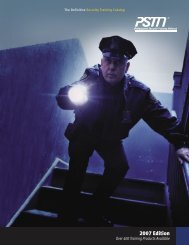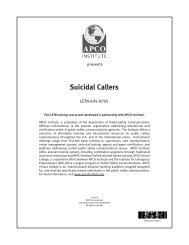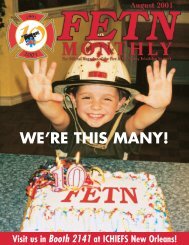SURVIVAL! Are Firefighters A Dying Breed? Spotlight on Geoff ...
SURVIVAL! Are Firefighters A Dying Breed? Spotlight on Geoff ...
SURVIVAL! Are Firefighters A Dying Breed? Spotlight on Geoff ...
You also want an ePaper? Increase the reach of your titles
YUMPU automatically turns print PDFs into web optimized ePapers that Google loves.
IS YOUR TECHNICAL RESCUE TEAM ALERT<br />
TO ENCROACHING ENVIRONMENTAL CLIMATIC CHANGES?<br />
Predict, Assess, and Prepare Now!<br />
by <strong>Geoff</strong> Williams<br />
MIFireE, MIMgt, ChFl, CIETecRI<br />
Deputy Firemaster,<br />
Central Scotland Fire Brigade, U.K.<br />
Technical Rescue teams should commence<br />
closer working with meteorological<br />
organizati<strong>on</strong>s to initiate predicting<br />
and customizing weather trends.<br />
<str<strong>on</strong>g>Are</str<strong>on</strong>g>as deemed vulnerable should be<br />
assessed and pre-planned for. This<br />
pre-planning should take account of<br />
the type of PPE and rescue equipment<br />
used by rescue pers<strong>on</strong>nel in order to<br />
ensure its suitability for this type of<br />
new, encroaching envir<strong>on</strong>ment.<br />
A review should commence to ensure<br />
that existing strategic command and<br />
c<strong>on</strong>trol centers can remain operative<br />
during ‘worst-case’ scenarios. Closer<br />
collaborati<strong>on</strong> between all agencies<br />
should be c<strong>on</strong>sidered to ensure combined<br />
cross boundary operati<strong>on</strong>s provide<br />
the best use of resources.<br />
Incentive and Inventive Legislati<strong>on</strong><br />
Within the USA, under a new law,<br />
states that prepare for natural disasters<br />
are being rewarded. They can get<br />
an extra 20 percent in government<br />
paid cleanup costs if they helped fortify<br />
for hurricanes, earthquakes, tornadoes,<br />
etc., which includes shoring up<br />
buildings, c<strong>on</strong>structing roads and<br />
water systems, and making utility<br />
18 CUSTOMER SUPPORT 800.932.3386<br />
infrastructures more enduring.<br />
Companies doing cleanup work will be<br />
paid faster and have less paperwork.<br />
The significance of this law is far<br />
more than its c<strong>on</strong>tent, as it recognizes<br />
the seriousness of natural disasters<br />
and has used incentives to motivate<br />
corrective acti<strong>on</strong> and provide a soluti<strong>on</strong>.<br />
It is a new c<strong>on</strong>cept, and it is<br />
innovative in using incentives to solve<br />
problems. Most practical disaster<br />
problems can be solved with people,<br />
m<strong>on</strong>ey and material, but the true victory<br />
is achieved by using the mind.<br />
And that brings us back to ourselves.<br />
We can make a difference. President<br />
Kennedy <strong>on</strong>ce stated, “One man can<br />
make a difference, and every man<br />
should try.” This phrase well defines<br />
the task of the Technical Rescue services.<br />
Technological Integrati<strong>on</strong><br />
and Applicati<strong>on</strong><br />
The Internati<strong>on</strong>al Emergency<br />
Technical Rescue Institute<br />
(http://www.fire.org.uk/ECL) recommends<br />
that we should attach ourselves<br />
to the newly created technologies<br />
that will assist us in predicting<br />
emerging threats and opportunities.<br />
Whether you embrace it or not, our<br />
business is justifiably going internati<strong>on</strong>al.<br />
During the earthquakes in<br />
India, I observed over the Internet<br />
real-time destructi<strong>on</strong> in that country.<br />
Today, certain previously catastrophestricken<br />
countries have risen like<br />
phoenix from the ashes of destructi<strong>on</strong>.<br />
Turkey now has an internati<strong>on</strong>al rescue<br />
c<strong>on</strong>tingent to save lives and promote<br />
restorati<strong>on</strong>. Such internati<strong>on</strong>al<br />
missi<strong>on</strong>s have immense social<br />
impacts and tend to bring the world<br />
closer together, but equally, the<br />
absence of a nati<strong>on</strong> willing to offer<br />
‘hands-<strong>on</strong>’ humanitarian aid can have<br />
the exact opposite effect.<br />
We should not spend scarce finances<br />
to build a communicati<strong>on</strong>s infrastructure<br />
when <strong>on</strong>e already exists. Unfortunately,<br />
that practice is becoming ubiquitous<br />
in order to underwrite global rescue<br />
missi<strong>on</strong>s and tackle the omnipresent<br />
terrorist threat. The Internet can be<br />
ever increasingly exploited to serve our<br />
tactical purposes.<br />
We need to ensure our political masters<br />
understand and support our scientific<br />
and technological organizati<strong>on</strong>s<br />
in designing systems that will help<br />
alleviate future tragedies.<br />
ECL — Structural Collapse Critical<br />
Crisis Tool Intelligence<br />
I have pers<strong>on</strong>ally researched over<br />
three thousand global collapse incidents,<br />
and I have analyzed and identified<br />
generic events that c<strong>on</strong>tinually<br />
recur at some stage during an incident.<br />
I then utilized my “Value Stage<br />
RACE Analysis,” which I designed to<br />
find the types of hindrances they<br />
caused the incident management<br />
teams. It so<strong>on</strong> became apparent that<br />
the same issues were always present.<br />
Therefore, the task of finding how<br />
these could be best (with hindsight)<br />
managed was the next stage of finding<br />
a soluti<strong>on</strong>. Once a soluti<strong>on</strong> had<br />
been found, it was then further reanalyzed<br />
to ensure it helped the actual<br />
Technical Rescue team’s rescue<br />
missi<strong>on</strong>. What was simple, plain informati<strong>on</strong><br />
now became transformed into<br />
expert, intelligence-based soluti<strong>on</strong>s.<br />
These soluti<strong>on</strong>s are now held within<br />
the ECL computer software critical crisis<br />
tool.<br />
Incident Command teams often<br />
underestimate how these ‘events’ and<br />
the people that are linked to them can<br />
severely disrupt and hinder their effectiveness,<br />
if they are not properly dealt<br />
with at a very early stage. Current<br />
incident management teams deal with<br />
the majority of these occurrences as<br />
they arise and until now they have<br />
never systematically been analyzed<br />
as to how they hinder or deviate<br />
teams from their primary objectives.<br />
Utilizing the new ECL has been<br />
proven to increase building/structural<br />
collapse management by 35%, thus<br />
increasing the victims’ chance of survival<br />
and increasing rescuer safety<br />
during the assignment.<br />
For more informati<strong>on</strong>, visit:<br />
http://www.globalcrisiscenter.com










